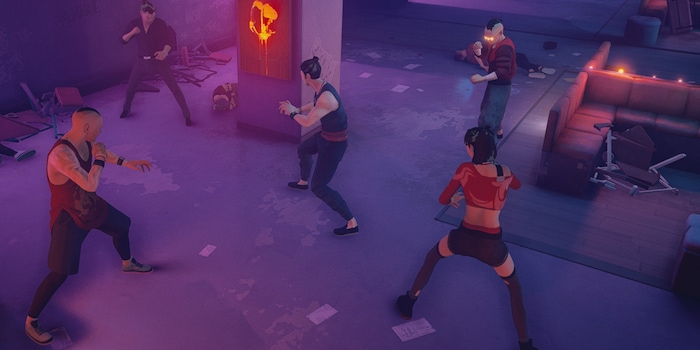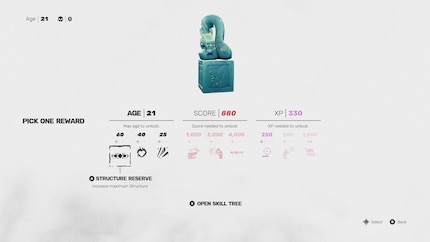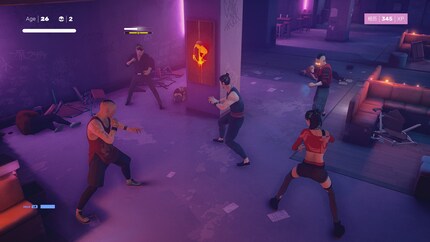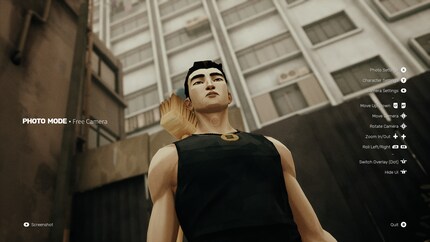
Product test
Nightmare Reaper in review: One of the best shooters of the year
by PC Games

With Sifu, Sloclap offers us a kung fu brawler with an Asian setting and heavy gameplay. Can the game convince despite or even because of its uncompromising design?
This is an article from our content partner "PC Games". Here you can find the original article by author Simon Hoffmann.
Actually, a playable kung fu movie sounds like a good idea. Who wouldn't want to take on the role of Bruce Lee, Jet Lii, Jean Claude Van Damme or Jackie Chan and beat up numerous bad guys at the same time with cool moves or weapons? In fact, there have been comparatively few games that combine cinematic presentation in the style of such movies with the medium of video games. A new representative of this combination is now available from Sloclap: Sifu, which was released on February 8 for PS5/PS4 and PC. It is supposed to be hard, but rewarding and brutal at the same time, an uncompromising game in all respects. Can the kung-fu action game leave a lasting and positive impression? Or is Sloclap's new game a qualitative slap in the face?
Sifu is first and foremost a 3D action game, in which the main task is to overpower a multitude of enemies in five large levels, as well as defeat the bosses in duels. You control the son or daughter (depending on the player's choice) of an old Kung Fu master, who was killed by criminals eight years ago. Naturally, you want revenge, so you set out to hunt down the five main culprits.

The plot is truly not revolutionary, but it provides a solid framework for the fantastic presentation. From the very first moment, the camera movements are just as professional and cinematic as the successful soundtrack. The minimalistic artstyle is also very successful. In addition, the levels are always visually creative and varied. All this leads to very cinematic and coherent brawls, which could also be shown in the cinema ... Well, if they weren't a video game.
The mechanics underlying these fights are quite simple at first sight. One button for heavy and light attacks, one button for blocking, the analog stick for dodging and a dash button. You also have a focus bar at your disposal, which you can use strategically for special attacks after recharging.
Nevertheless, quite a few players will want to smash the controller or optionally the mouse and keyboard against the wall by the second level at the latest. Sifu is a damn difficult and sometimes frustrating game, especially at the beginning.
If you don't concentrate 100 percent and counterattack, dodge or simply flee with pinpoint accuracy, you'll bite the dust relatively quickly. After all, there are no items that could heal you. You want to regenerate health? Good, then finish off enemies, at best a lot of them! There are also no checkpoints in the levels. So it's hardly possible to complete the game unless you dig deep into the various game mechanics.

When you find your way to the afterlife, which will happen quickly, our main character can resurrect himself thanks to a magical amulet. With each resurrection you'll grow older. If you die several times in a row, your previous deaths will be added to your previous age. This process continues until you are in your 70s, at which point the amulet breaks completely and it's "Game Over".
Simultaneously with your age your strength increases bit by bit, but at the same moment you lose maximum health. At the latest during your midlife crisis, you should consider taking a little precaution and pay more attention to your defense. You can also learn new skills and unlock level-specific bonuses over the course of the game.
The age is not reset after each level, but is counted throughout the entire game. Therefore, it is not necessarily recommended to complete the first level at retirement age. But don't worry, you can always go back to earlier levels to reduce the age at which you completed them. However, this is not quite as helpful as you might think. Imagine that you've managed to complete a difficult level by the skin of your teeth and just barely made it to the boss fight. Is it even worth completing the level if you know you won't stand a chance in the next world as an old man? After all, you'll most likely have to play the level a few more times anyway to become young again.
Often this kind of backtracking is annoying. Sure, it's supposed to make you better and better, and this effect does happen. But imagine you run through one of the very long levels to become younger, and then you still die several times at the boss. Then all the effort was for nothing and you have to start all over again. There are no checkpoints in the levels, only moderately helpful shortcuts instead.
In addition, the visual feedback in the fights is very confusing. It's often not apparent how to counter or dodge enemies. Surely practice makes perfect.
But an optional indication of whether you countered too early or too late, for example, as in the WWE2K games, would have made sense. Especially the defense is ultimately the linchpin of the gameplay.
However, you should rather not expect a corresponding patch: Sifu is uncompromising and obviously proud of it. No mercy in this video game dojo, then, nor are there easier difficulty levels.
However, if you are willing to learn the mechanics, you will discover fantastic mechanics. The highlight is definitely the creative and cinematically staged boss fights: memorable fights that require a lot of time and patience, but reward you with a very satisfying feeling when you defeat them for the first time. Despite all the frustration, you're motivated to return over and over again and finish the bosses with fewer or no deaths.
The levels are also mighty fun with a certain understanding of the mechanics. Especially when playing an area for the first time, each new wave of enemies offers a crisp challenge. Especially adversaries with weapons stand out as positive examples here. Our repertoire is very variable for these duels, both offensively and defensively, and allows for different approaches.

However, the mediocre camera is anything but helpful on the way to becoming a virtual kung fu ace. Not only does it like to get caught in one wall or another, but it's often far too close to our main character. So don't be surprised if, frustrated and surrounded by five bad guys, you suddenly die from a hit you couldn't see. This is anything but fun. However, there were no other technical problems as we had noticed in the preview, with the exception of sometimes flickering shadows.
An inconspicuous, but nice highlight is the photo mode. Amateur photographers can use the virtual camera to set the levels and characters in scene. The mode works flawlessly and offers a nice contrast to the very stressful and intense gameplay.

Those who take on the Sifu challenge will eventually be rewarded with the feeling of having successfully mastered the game's mechanics. However, more than a few players will probably feel overwhelmed demonizing the steep learning curve. Thus, Sifu is definitely not a game for everyone - but one that you won't soon forget if you give it a chance.
Sifu was an ambivalent experience for me. While playing it, I partially hated it, cursed it, and wondered how on earth just countering worked properly. No contrast to my current appreciation for the game and desire to play it again and again. Sifu rewards those who embrace its uncompromising design. If you are willing to invest a lot of time, patience, and possibly broken controllers, you will have a lot of fun with Sifu. The rewarding feeling of defeating a boss almost perfectly or finding new and effective shortcuts is absolutely terrific. And I definitely had and still have that fun. But I don't know if a few features would have been good for people who don't have the time or patience for this design, at least as optional options. Well, maybe then the git gud keyboard warriors would complain about it ....
Sifu has been available since February 8, 2022 for the PC as well as Playstation 5 and Playstation 4. On PC, you can currently only purchase the game from the Epic Games Store, and versions for Xbox and Nintendo Switch have also not been announced, at least not yet. The boxed versions for PS4 and PS5 will be available on May 3, 2022.
PC games: cutting-edge news, videos, previews and critical reviews, thoroughly researched reports and handy tips on everything to do with PC games, console games and PC hardware.